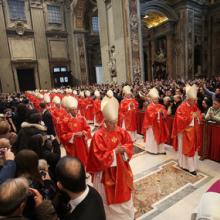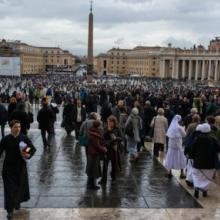Cardinals
If President Obama’s appearance at the Notre Dame commencement in 2009 sparked an unprecedented uproar among American Catholics, imagine what inviting President Trump to graduation might provoke.
That concern is making Notre Dame’s president, the Rev. John Jenkins, think twice about making a pitch for the incoming U.S. president to receive an honorary degree, an appearance that almost any school would normally covet — and one that the iconic Catholic university has been more successful than others in securing.
Pope Francis on [Nov. 11] made a surprise visit to meet several men who took the controversial step of leaving the priesthood and starting a family.
A Vatican statement said the pope left his residence in the afternoon and traveled to an apartment on the outskirts of Rome, where he met seven men who had left the priesthood in recent years. The pontiff also met their families.
There’s barely a sound and the corridors are still empty when the neatly dressed Crea suddenly flicks a switch to reveal walls lined with Renaissance frescoes and priceless tapestries.
It’s a stunning moment, and Crea, who holds the title of “clavigero,” or chief key keeper at the Vatican Museums, never tires of it. He manages a dedicated team that opens and closes some 300 rooms every day.
With these picks, the third round of cardinal appointments Francis has made since he himself was elected pope in 2013, he did a number of nontraditional things that have become almost customary for him:
First of all, he moved the church’s center of gravity further away from the Old World and toward the “peripheries,” as he says, by selecting more cardinals (six total) from Africa, Asia, and Oceania than from Europe (five).
Pope Francis reinforced his radical reshaping of the Catholic Church by naming 20 new cardinals from countries as far afield as Ethiopia, Tonga, Thailand, and Panama.
The clerics – who come from 18 different countries – include 15 who are eligible to vote for the pope’s successor in a future conclave, and five retired bishops and archbishops “distinguished for their pastoral charity” who are over age 80 and ineligible to select the next pontiff.
Dissatisfied with the slow pace of change in Rome, Francis’ appointments reflect his desire for “pastors on the front line of difficult situations,” one Vatican observer said, who can bring a new perspective from the often overlooked outposts of global Christianity.
The Vatican’s chief spokesman, the Rev. Federico Lombardi, said the choices showed the pope’s most important criteria was “universality,” and indicated he was not “chained to tradition” as he moves the balance of power at the highest levels of the church closer to the developing world.
It is the first time ever that cardinals have been selected from Tonga, Myanmar, and Cape Verde to become “princes of the church.” There are only five Europeans included among the 15 new electors – two from Italy and three others from Corsica, Spain, and Portugal. The United States was shut out for the second time in a row.
Pope Francis nominated 15 new cardinals Jan. 4 from 14 different nations but leaving several leading U.S. archbishops off the list.
Speaking to a crowd gathered in St. Peter’s Square, the pontiff named each cardinal, noting they came from every continent and “show the indelible tie with the church of Rome to churches in the world.” At least three are from nations that have never had a church member in the role.
Five of the cardinals come from Europe, three from Asia, three from Latin America, and two each from Africa and Oceania.
The nations of Cape Verde, Tonga, and Myanmar received their first cardinals ever, Vatican spokesman Fr. Federico Lombardi said in a statement.
Pope Francis created his first batch of new cardinals on Saturday and used the ceremony to launch a new appeal for peace amid the violence racking so many countries.
Francis focused his remarks on the plight of Christians, but in an extemporaneous addition to his prepared text he also called on the church “to fight any discrimination” and “exclusion.”
“The church needs your compassion, especially at this time of pain and suffering for so many countries throughout the world,” Francis told the 18 new cardinals who were present in St. Peter’s Basilica, along with hundreds of other cardinals and bishops whose colorful vestments and diverse origins offered a grand tableau of global Catholicism.
As Pope Francis led the world’s cardinals in talks aimed at shifting the church’s emphasis from following rules to preaching mercy, a senior American cardinal took to the pages of the Vatican newspaper on Friday to reassure conservatives that Francis remains opposed to abortion and gay marriage.
Cardinal Raymond Burke acknowledged that the pope has said the church “cannot insist only on issues related to abortion, gay marriage, and the use of contraceptive methods.” But in his toughly worded column in L’Osservatore Romano, the former archbishop of St. Louis blasted those “whose hearts are hardened against the truth” for trying to twist Francis’ words to their own ends.
Burke, an outspoken conservative who has headed the Vatican’s highest court since 2008, said Francis in fact strongly backs the church’s teaching on those topics. He said the pope is simply trying to find ways to convince people to hear the church’s message despite the “galloping de-Christianization in the West.”
Pope Francis on Thursday opened a major two-day meeting on the church’s approach to the complexities of modern family life, telling the world’s Catholic cardinals that the church needs a “pastoral” approach that is “intelligent, courageous, and full of love” and not focused on abstract arguments.
In brief introductory remarks released by the Vatican, Francis pushed the closed-door summit of about 150 cardinals to “deepen the theology of the family and discern the pastoral practices which our present situation requires.”
He asked that they do so “thoughtfully” and by keeping the focus on “the beauty of family and marriage” while at the same time showing that the church is ready to help spouses “amid so many difficulties.” Francis added the phrase “intelligent, courageous, and full of love” extemporaneously.
The National Security Agency spied on cardinals as they prepared to select the new pope — perhaps including even Cardinal Jorge Bergoglio, who emerged from last spring’s conclave as Pope Francis, a leading Italian news magazine reported in Wednesday’s editions.
Pope Francis still lives in the guesthouse, but the magazine did not speculate whether the phones there were still tapped.
Watching sports is not as much fun as it used to be.
I blame Jesus for that, because he just had to say:
“Love thy enemy.”
Or, as Chad Gibbs puts it in the title of his fantastic book on spirituality and sports, Love thy Rival.
VATICAN CITY — As 115 cardinal-electors solemnly processed into the Sistine Chapel on Tuesday afternoon, with a cry of “Extra omnes!” and the latest high-tech jamming devices cutting them off from the world, the buzz outside the Vatican over who would eventually emerge as pope grew deafening.
Everyone had theories, many had favorites, and most declared it all so unpredictable that the winner – or even how long it would take to find him – was anybody’s guess.
“We are living through an extraordinary conclave,” Marco Tosatti wrote in La Stampa, the Italian daily whose insider coverage of the pre-conclave meetings read like a tip sheet for papal bookies.
“If we look at the history of conclaves over the last century, never has there been such a range of choices, and such uncertainty over the outcome up to the moment that the doors of the Sistine Chapel closed,” he said.
In fact, the latest lines were varied and morphing all the time, a feast of permutations for Vaticanisti who parse papal elections the way sci-fi geeks deconstruct a new installment of “Star Wars.”
VATICAN CITY — Black smoke from the chimney atop the Sistine Chapel signaled that the first day of the conclave ended without the election of a new pope.
Even if the first-round outcome was largely expected, thousands of people on Tuesday braved the inclement Roman weather to wait for the result of the vote. They slowly filled up St. Peter’s Square as the evening progressed, with their eyes fixed on the small chimney.
Cries of disappointment erupted from the crowd when the black smoke appeared instead of the white smoke that would herald a successful election.
In Catholic theology, as in the popular imagination, the closed-door conclave to elect a new pope is supposed to be guided by the Holy Spirit.
There’s no horse-trading or lobbying, no insider deal-making or outside influences allowed. Just red-robed cardinals solemnly entering the Sistine Chapel, accompanied only by prayers and their consciences, sitting beneath Michelangelo’s fresco of the Last Judgment and discerning God’s will on who should be the next successor to St. Peter.
At least that’s the theory. The last millennium has shown that papal elections can be fraught with politics or worse, and can take months or even years of wrangling to reach a resolution.
Tensions among the Roman Catholic cardinals meeting here to choose a new pope appeared to escalate on Wednesday as the American prelates in Rome canceled their daily press briefing under pressure from colleagues who are frustrated over news coverage of their secret talks.
The cardinals also announced that they still had not been able to agree on a start date for the conclave, in which 115 electors will cast their ballots for a successor to Pope Benedict XVI.
The effort to control the flow of information from the daily pre-conclave “General Congregation” meetings marked a sharp reversal from the unprecedented openness that had characterized this first papal conclave of the digital age.















